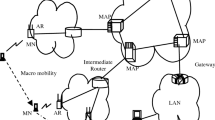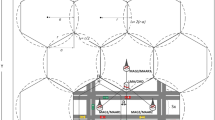Abstract
Network-based mobility protocols, such as proxy mobile IPv6, are widely recognized as one of the most popular options for facilitating seamless mobility and reducing the burden of mobility-related signaling on mobile nodes in massive IoT environments. In the modern IoT ecosystem, experts in the field leverage the capabilities of artificial intelligence to enhance the performance of such protocols. The forthcoming communication paradigm offers enhanced mobility, extensive data transmission capabilities, robust security measures, and a wider array of heterogeneous internet-accessible devices. To meet the requirements and ensure the quality of services, domain experts are actively exploring avenues to develop efficient mobility protocols and cost-effective mobility solutions. To address the existing and future mobility requirements, this research introduces a comprehensive framework that is capable for optimizing services as well as energy efficiency. The proposed solution is thoroughly evaluated, and the effectiveness of the framework is validated. The evaluation results demonstrate that the proposed solution effectively achieves service optimization, and energy efficiency, and provides an efficient framework for accommodating the mobility requirements of both current and future AIoT environments.











Similar content being viewed by others
Data availability
No datasets were generated or analysed during the current study.
References
Cai Q, Chen J, Luo D, Sun G, Yu H et al (2024) Deter-pay: a deterministic routing protocol in concurrent payment channel network. IEEE Internet Things J. https://doi.org/10.1109/JIOT.2024.3416086
Hussain A et al (2021) A resource efficient hybrid proxy Mobile IPv6 extension for next generation IoT networks. IEEE Internet Things J
Salahdine F et al (2023) Security in 5G and beyond recent advances and future challenges. 6(1):e271
Hussain A et al (2020) Analysis of PMIPv6 extensions for identifying and assessing the efforts made for solving the issues in the PMIPv6 domain: a systematic review. Comput Netw:107366
Jabir AJ et al (2015) A comprehensive survey of the current trends and extensions for the proxy mobile IPv6 protocol. 12(1):1065–1081
Ban Y, Liu Y, Yin Z, Liu X, Liu M, Yin L et al (2024) Micro-directional propagation method based on user clustering. Comput Inf 42(6):1445–1470. https://doi.org/10.31577/cai_2023_6_1445
Park, S., C. Um, and J. Jeong. On cost-effective Inter-LMA domain handover scheme in NEMO-PMIPv6 networks. in Mobile Web and Intelligent Information Systems: 14th International Conference, MobiWIS 2017, Prague, Czech Republic, August 21–23, 2017, Proceedings 14. 2017. Springer
Gundavelli, S., et al., Proxy mobile ipv6. 2008
Cheng Y, Deng X, Qi Q, Yan X (2022) Truthfulness of a network resource-sharing protocol. Math Oper Res 48(3):1522–1552. https://doi.org/10.1287/moor.2022.1310
SAJWAN, M.P., Technique to improve efficiency of energy for data aggregation using internet of things. 2023
Modares H et al (2016) A survey on proxy Mobile IPv6 handover. 10:208–217
Li, T., Kouyoumdjieva, S. T., Karlsson, G., & Hui, P. (2019). Data collection and node counting by opportunistic communication. Paper presented at the 2019 IFIP Networking Conference (IFIP Networking) from https://doi.org/10.23919/IFIPNetworking46909.2019.8999476
Sun G, Zhang Y, Yu H, Du X, Guizani M (2020) Intersection fog-based distributed routing for V2V communication in urban vehicular ad hoc networks. IEEE Trans Intell Transp Syst 21(6):2409–2426. https://doi.org/10.1109/TITS.2019.2918255
Kang B, Park C, Choo H (2019) A location aware fast PMIPv6 for low latency wireless sensor networks. IEEE Sensors J:1–1
Wang F, Yao H, He W, Chang H, Xin X et al (2023) Time-sensitive scheduling mechanism based on end-to-end collaborative latency tolerance for low-earth-orbit satellite networks. IEEE Trans Netw Sci Eng:1–15. https://doi.org/10.1109/TNSE.2023.3342938
Zhang L, Tian Y-CJWN (2018) An enhanced fast handover triggering mechanism for fast proxy Mobile IPv6. 24(2):513–522
Oh, S. and H. Choo. Low Latency Handover Scheme Based on Optical Buffering at LMA in Proxy MIPv6 Networks. 2009. Berlin, Heidelberg: Springer Berlin Heidelberg
Huang, W., Li, T., Cao, Y., Lyu, Z., Liang, Y., Yu, L.,... Li, Y. (2023). Safe-NORA: Safe Reinforcement Learning-Based Mobile Network Resource Allocation for Diverse User Demands. Paper presented at the CIKM '23, New York, NY, USA from https://doi.org/10.1145/3583780.3615043
Berguiga A et al (2018) FPMIPv6-S: an enhanced mobility protocol for 6LoWPAN-based wireless Mobile sensor networks. Springer International Publishing, Cham
Gohar M et al (2020) Partial Bicasting with buffering for proxy Mobile IPV6 mobility management in CoAP-based IoT networks. Electronics 9(4):598
Park C et al (2014) Buffering in proxy mobile IPv6: implementation and analysis. 68(3):1503–1520
Ko H et al (2017) DLM: delayed location management in network mobility (NEMO)-based public transportation systems. J Netw Comput Appl 85:127–133
Yokota, H., et al. Fast handovers for proxy mobile IPv6. in RFC 5949. 2010
Choi H-Y et al (2011) Smart buffering for seamless handover in proxy mobile IPv6. Wirel Commun Mob Comput 11(4):491–499
Park, C., H. Choo, and H.J. Choe. Location-aware fast handover in proxy mobile IPv6. in 2013 IEEE 78th Vehicular Technology Conference (VTC Fall). 2013. IEEE
Li T, Xiao Z, Georges H, Luo Z, Wang D (2016) Performance analysis of co- and cross-tier device-to-device communication Underlaying macro-small cell wireless networks. KSII Trans Internet Inf Syst 10(4):1481–1500. https://doi.org/10.3837/tiis.2016.04.001
Acknowledgements
The work is supported by the Qatar National Library [QUHI-CBE-21/22-1]. This work is also supported by Qatar University, Doha, Qatar, internal Grant IRCC- 2021-010.
Funding
The authors haven’t received any funding for this article.
Author information
Authors and Affiliations
Contributions
Conceptualization, H.U.K; Data curation and Formal analysis, F.A; Investigation, and Methodology, A.H; Software, Validation, Visualization, S.N; Writing – original draft, A.H; Writing – review & editing, F.A.
Corresponding authors
Ethics declarations
Competing interests
The authors declare no competing interests.
Additional information
Publisher’s note
Springer Nature remains neutral with regard to jurisdictional claims in published maps and institutional affiliations.
This article is part of the Topical Collection: 1- Track on Networking and Applications
Guest Editor: Vojislav B. Misic
Rights and permissions
Springer Nature or its licensor (e.g. a society or other partner) holds exclusive rights to this article under a publishing agreement with the author(s) or other rightsholder(s); author self-archiving of the accepted manuscript version of this article is solely governed by the terms of such publishing agreement and applicable law.
About this article
Cite this article
Khan, H.U., Hussain, A., Nazir, S. et al. AIoT-enabled service prioritization for mobile nodes using enhanced PMIPv6 extension protocol. Peer-to-Peer Netw. Appl. 18, 73 (2025). https://doi.org/10.1007/s12083-024-01844-2
Received:
Accepted:
Published:
DOI: https://doi.org/10.1007/s12083-024-01844-2




